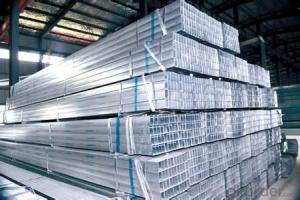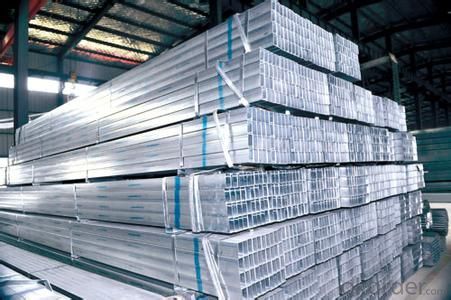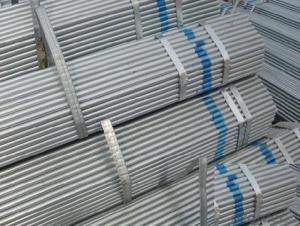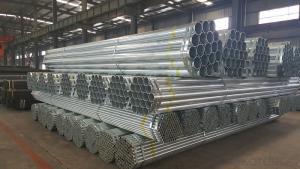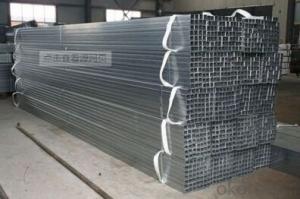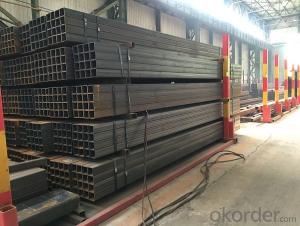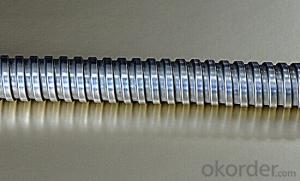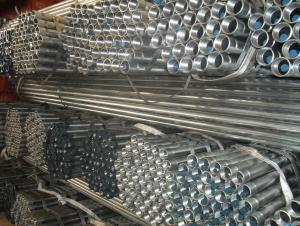Galvanized Rectangular Steel Tube
- Loading Port:
- China Main Port
- Payment Terms:
- TT or LC
- Min Order Qty:
- 25 m.t.
- Supply Capability:
- -
OKorder Service Pledge
OKorder Financial Service
You Might Also Like
Product Description:
1、Structure of Galvanized Rectangular Steel Tube Description:
Galvanized Rectangular Steel Tube is formed by drawing a solid billet over a piercing rod to create the hollow shell.
As the manufacturing process does not include any welding, seamless pipes are perceived to be stronger and more reliable. Historically seamless pipe was regarded as withstanding pressure better than other types, and was often more easily available than welded pipe.
2、Main Features of the Galvanized Rectangular Steel Tube:
• High manufacturing accuracy
• High strength
• Small inertia resistance
• Strong heat dissipation ability
• Good visual effect
• Reasonable price
3、Galvanized Rectangular Steel Tube Images:
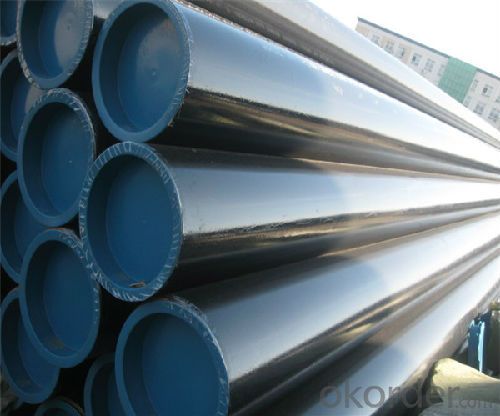
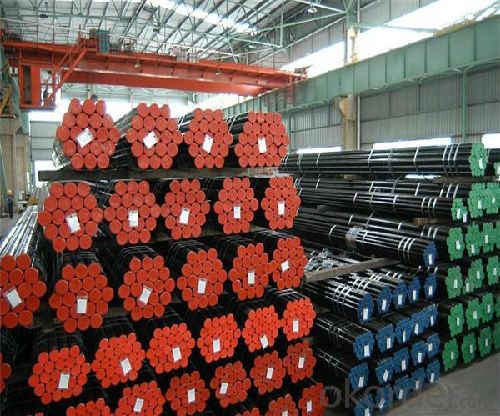
Packaging & Delivery
Packaging Details: | seaworthy package,bundles wrapped with strong steel strip |
Delivery Detail: | 15-30days after received 30%TT |
4、Galvanized Rectangular Steel Tube ASTM A106/53 Specification:
Standard | GB, DIN, ASTM |
Grade | 10#-45#, 16Mn |
Thickness | 8 - 33 mm |
Section Shape | Round |
Outer Diameter | 133 - 219 mm |
Place of Origin | Shandong, China (Mainland) |
Secondary Or Not | Non-secondary |
Application | Hydraulic Pipe |
Technique | Cold Drawn |
Certification | API |
Surface Treatment | factory state or painted black |
Special Pipe | API Pipe |
Alloy Or Not | Non-alloy |
Length | 5-12M |
Outer Diameter | 21.3-610mm |
Grade | 20#, 45#, Q345, API J55, API K55, API L80, API N80, API P110, A53B |
Standard | ASME, ASTM |
1.Material:20#(ASTM A 106/A53 GRB.API5LGRB,GB),45#,16Mn,10#.
2.Specification range:OD:21.3-610mm,WT:6-70mm,length:6-12m or according to the requirement of clients.
3.Excutive standards:GB,ASME API5L.ASTM A 106/A53,Despite of the above standards,we can also supply seamless steel pipe with standard of DIN,JIS,and so on,and also develop new products according to the requirements of our clients!
4.Surface:black lacquered,varnish coating or galvanized.
5.Ends:Beveled or square cut,plastic capped,painted.
6.Packing:bundles wrapped with strong steel strip,seaworthy packing.
5、FAQ of Galvanized Rectangular Steel Tube:
①How is the quality of your products?
Our products are manufactured strictly according to national and internaional standard, and we take a test
on every pipe before delivered out. If you want see our quality certifications and all kinds of testing report, please just ask us for it.
Guaranteed: If products’ quality don’t accord to discription as we give or the promise before you place order, we promise 100% refund.
②How about price?
Yes, we are factory and be able to give you lowest price below market one, and we have a policy that “ for saving time and absolutely honest business attitude, we quote as lowest as possible for any customer, and discount can be given according to quantity”,if you like bargain and factory price is not low enough as you think, just don’t waste your time.Please trust the quotation we would give you, it is professional one.
③Why should you chose us?
Chose happens because of quality, then price, We can give you both.Additionally, we can also offer professional products inquiry, products knowledge train(for agents), smooth goods delivery, exellent customer solution proposals.Our service formula: good quality+good price+good service=customer’s trust
SGS test is available, customer inspection before shipping is welcome, third party inspection is no problem.
Any question, pls feel free to contact us !
- Q: What are the environmental benefits of using steel pipes?
- Using steel pipes has multiple environmental benefits: 1. Longevity: Steel pipes have a prolonged lifespan, minimizing the need for frequent replacements. This conserves resources and reduces waste generation. 2. Recyclability: Steel is extensively recycled worldwide. When steel pipes reach the end of their life, they can be easily recycled and used to produce new steel products. This reduces the demand for raw materials and saves energy that would otherwise be necessary for manufacturing new materials. 3. Decreased carbon emissions: Steel pipes have a lower carbon footprint compared to materials like concrete or plastic. The manufacturing process emits fewer greenhouse gases, contributing to an overall lower carbon footprint. 4. Corrosion resistance: Steel pipes exhibit high resistance to corrosion, requiring less maintenance and repair compared to other materials. This reduces the need for chemical coatings and treatments that can have detrimental environmental effects. 5. Water conservation: Steel pipes are commonly used in water supply and distribution systems. Their smooth interiors minimize friction, reducing the energy required to pump water through the pipes. This conserves energy and decreases carbon emissions associated with water transportation. 6. Fire resistance: Steel pipes are inherently fire-resistant, making them a safer choice for various applications. In the event of a fire, steel pipes help contain the spread of flames and minimize environmental damage. In summary, the use of steel pipes provides numerous environmental benefits, including durability, recyclability, reduced carbon emissions, water conservation, and fire resistance. These factors make steel pipes a sustainable option for various infrastructure projects.
- Q: What is the difference between API 5L and ASTM A53 steel pipes?
- API 5L and ASTM A53 are widely utilized carbon steel pipe standards with similar purposes but notable distinctions. 1. In terms of scope, API 5L pertains to seamless and welded pipes for transporting oil, gas, water, and other fluids. It encompasses plain-end, threaded-end, and belled-end pipe types. Conversely, ASTM A53 is a standard specification for seamless and welded black and hot-dipped galvanized steel pipes utilized in mechanical and pressure applications. 2. The manufacturing processes differ, as API 5L pipes undergo hot-rolling, while ASTM A53 pipes undergo either hot-rolling or cold-drawing. This variance affects the chemical composition and mechanical properties of the pipes. 3. Generally, API 5L pipes have a higher carbon content compared to ASTM A53 pipes. This discrepancy arises from the intended use of API 5L pipes for conveying oil, gas, and water, necessitating greater strength and durability. On the other hand, ASTM A53 pipes cater to mechanical and pressure applications, where lower carbon content is deemed appropriate. 4. API 5L pipes exhibit higher minimum yield strength and tensile strength than ASTM A53 pipes. This outcome stems from the increased carbon content and more stringent manufacturing process employed for API 5L pipes. Conversely, ASTM A53 pipes possess lower yield and tensile strength requirements, rendering them more suitable for general-purpose applications. 5. API 5L pipes offer various coating options, including black varnish, 3PE, FBE, among others, depending on the specific application requirements. In contrast, ASTM A53 pipes are typically hot-dipped galvanized to enhance corrosion resistance. In conclusion, API 5L and ASTM A53 steel pipes differ in scope, manufacturing processes, chemical compositions, mechanical properties, and coating options. The appropriate choice of pipe hinges upon specific application requirements, such as the nature of the conveyed fluid, operating conditions, and desired strength and durability.
- Q: What is the difference between seamless steel pipes and seamless stainless steel pipes?
- The main difference between seamless steel pipes and seamless stainless steel pipes lies in their composition. Seamless steel pipes are typically made from carbon steel, which is an alloy of iron and carbon. On the other hand, seamless stainless steel pipes are made from an alloy of iron, carbon, and chromium, which gives them enhanced corrosion resistance and durability. This makes seamless stainless steel pipes suitable for applications where resistance to corrosion is essential, such as in the food industry or in environments with high humidity or exposure to chemicals.
- Q: What are steel pipes used for?
- Steel pipes are commonly used for transporting fluids and gases, as well as for structural applications such as construction, oil and gas exploration, and plumbing systems.
- Q: Is hot dipped plastic pipe steel?
- Hot dip pipe used in fluidized bed impregnation process, one-time into new anti-corrosion steel production process is the original film, plastic pipe or electrostatic nozzle replace (the products by physical treatment process)
- Q: Difference between cold rolled steel pipe and common steel pipe
- From the above point of view, the hot rolled steel pipe used in fluid transport, mechanical structure and other requirements of the size of the situation is not high, cold-rolled steel pipe used in precision instruments, hydraulic systems, pneumatic and other places demanding.
- Q: How are steel pipes measured and categorized?
- Steel pipes are typically measured and categorized based on their outer diameter (OD) and wall thickness. The OD is measured in inches or millimeters, while the wall thickness is measured in inches or centimeters. Pipes are further categorized based on their schedule, which refers to the wall thickness and determines the pressure rating of the pipe. The schedule is denoted by a letter or number, such as Schedule 40 or Sch 80. These measurements and categorizations help in selecting the appropriate steel pipe for different applications and ensure compatibility with fittings and other components.
- Q: How do steel pipes handle water hammer?
- Steel pipes can effectively handle water hammer by absorbing the pressure surges caused by sudden changes in water flow. The solid and durable nature of steel helps to dampen the impact and prevent damage to the pipes or other components of the plumbing system. Additionally, steel pipes can be designed and installed with appropriate supports, expansion joints, and water hammer arrestors to further mitigate the effects of water hammer.
- Q: Do steel pipes require maintenance?
- Yes, steel pipes do require maintenance. While steel pipes are durable and long-lasting, they can still be subject to wear and tear over time. Regular maintenance is important to ensure their optimal performance and prolong their lifespan. One important aspect of maintenance is inspecting the pipes for any signs of damage or corrosion. Steel pipes can be vulnerable to rust and corrosion, especially in environments with high humidity or exposure to water. Regular inspections allow for early detection of any issues, which can prevent more significant damage and costly repairs in the future. Another aspect of maintenance is cleaning the pipes. Over time, steel pipes can accumulate debris, sediment, or mineral deposits. These build-ups can restrict the flow of fluids or affect the quality of the transported materials. Regular cleaning helps to remove these obstructions and maintain the efficiency of the pipes. Depending on the application, steel pipes may also require periodic lubrication or coating. This helps to reduce friction, prevent corrosion, and enhance the pipes' durability. Lubricants and coatings can be applied during maintenance to ensure the pipes continue to function smoothly and resist corrosion. Overall, regular maintenance of steel pipes is essential to maximize their performance, prevent damage, and prolong their lifespan. By investing time and effort in maintenance, potential issues can be identified and addressed early on, ultimately saving time and money in the long run.
- Q: What is the lifespan of a steel pipe?
- The lifespan of a steel pipe can vary depending on various factors such as its quality, maintenance, and usage conditions. However, with proper care and maintenance, a well-made steel pipe can last for several decades or even more.
Send your message to us
Galvanized Rectangular Steel Tube
- Loading Port:
- China Main Port
- Payment Terms:
- TT or LC
- Min Order Qty:
- 25 m.t.
- Supply Capability:
- -
OKorder Service Pledge
OKorder Financial Service
Similar products
Hot products
Hot Searches
Related keywords
